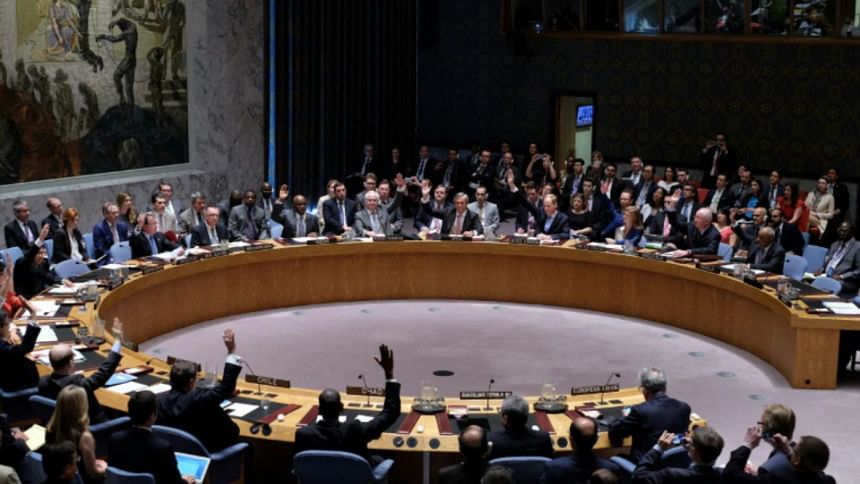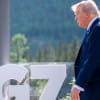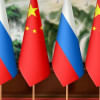Trump puts Iran nuclear deal in jeopardy

During his presidential campaign, Donald Trump repeatedly declared that the Iran nuclear deal, known as "Joint Comprehensive Plan of Action" (JCPOA), was the worst agreement the US has ever signed, and his first priority as president would be to "tear up" the deal. JCPOA has limited Iran's nuclear programme in exchange for removal of all sanctions imposed by the West and the United Nations.
Trump administration is required to certify to the Congress every 90 days that Iran is complying with JCPOA. On April 18, 2017 the first certificate on Iran's compliance was given by Trump grudgingly.
The second certification was due in mid-July 2017, when an acrimonious debate ensued in the White House over whether to certify or decertify Iran on following JCPOA. However, on July 17, 2017, Trump agreed to certify that Iran is complying with the deal. The next day Trump imposed new sanctions on Iran.
The sanctions were against 18 Iranian individuals, groups and networks for non-nuclear behaviour, freezing any assets that the targets may have in the US and preventing Americans from doing business with them. Imposing new sanctions right after providing the certification is definitely an absurd, illogical policy.
Trump's contempt for Iran is well known and Iran still is in the US State Department's list of state sponsors of terrorism. What will be Trump's decision in mid-October 2017, when the next certification is due, will be something to note. Trump might be heartened by the fact that the Congress on July 25, 2017 overwhelmingly endorsed a harsh bill to impose new sanctions on Iran, Russia and North Korea.
Interestingly, the sanctions were not directed at Iran for any breach of the nuclear deal but for developing missiles. Iran had tested ballistic missile on January 29, 2017, and on July 27, launched an advanced satellite-carrying rocket into space. These tests have angered Trump that provoked the sanctions. Incidentally, the latest International Atomic Energy Agency (IAEA) report published on June 2, 2017 did not mention any breach of JCPOA by Iran.
JCPOA was a deal signed by Iran with the five permanent members of UN Security Council and Germany (P5+1) on July 14, 2015. The deal coordinated by EU was endorsed by the UN Security Council and its implementation began on January 16, 2016. Donald Trump was at odds with leaders of the other permanent members (UK, France, Germany, Russia and China) when at the G20 summit in Hamburg (July 7-8) he tried to persuade them to stop normalising economic and commercial relations with Iran.
Trump cannot walk out of the deal as JCPOA is a multilateral agreement endorsed by UN. Trump can neither change nor scuttle it unilaterally. Even if he takes US out of the agreement, the other five members will not terminate their relations with Tehran, as there are tremendous economic benefits to be reaped from a sanction-free Iran.
European companies are happy that Trump has restricted American firms from doing business with Iran, meaning they are not in competition. French motor companies have signed a USD 778 million contract to produce 150,000 cars in Iran. French oil giant Total SA and Chinese Oil Company signed a USD 5 billion agreement to develop the offshore gas fields of Iran. China and Iran agreed to increase trade to USD 600 billion in the next 10 years.
German exports to Iran rose by 26 percent in 2016 and are expected to reach USD 5 billion by 2018. Russian exports to Iran rose 80 percent during 2016, and with Russian state loans, the figure is expected to reach USD 10 billion. British banks and firms are likely to invest substantially in Iran's expanding rail network. European consortium Airbus has already delivered planes worth USD 19 billion in 2016. There are more in the pipeline.
The United States is the only one lagging behind with only USD 258 million in exports to Iran in 2016. Intriguingly, Boeing's contract with Iran Air worth USD 16.6 billion for 80 jetliners, and another USD 3 billion with Iran Aseman, haven't been affected by Trump's sanctions.
Trump, after withdrawing from the Paris Global Climate Change Accord, has already created a distance between himself and other world leaders rejecting Trump's idea to renegotiate JCPOA. By unilaterally slapping sanctions and restricting US firms from doing business with Iran, Trump has landed himself in a Catch 22 situation. He is undermining his "America first" dictum.
Tehran is determined to preserve JCPOA as it has allowed Iran to come out of isolation and export its oil freely. Iran's oil revenues reached USD 41 billion in the fiscal year ending March 20, 2017, which is helping in expanding the economy. Tehran condemned the sanctions as "contemptible and worthless". Foreign Minister Javad Zarif said the sanctions aim to "poison the atmosphere" and violate the "spirit" of the nuclear agreement. Tehran vowed to continue with it missile programme as it was not part of JCPOA.
The sanctions, though will not significantly harm Iran, have come at a time when President Hassan Rouhani, re-elected for a second term in May 2017, is facing increasing demands to rebuild the economy.
Washington has to realise that abrogating JCPOA will entail some dangers. Hassan Rouhani is seen as a pragmatist, one willing to normalise relations with the West. US sanctions and pressures on Rouhani will only encourage Iranian hardliners, making it difficult for Rouhani to continue abiding by JCPOA. Rouhani may be compelled to throw away the deal and restart the nuclear programme with vengeance.
Many Republicans and advisers have urged Donald Trump not to abandon the agreement. Trump needs to be reminded that JCPOA has sobered Iran and sanctions did not stop Tehran from developing its nuclear-fuel enrichment in the past. Trump would do well to maintain the status quo and not jeopardise JCPOA. With his presidency in disarray and no clear foreign policy, Trump has more pressing problems at hand—threats from North Korea.
Mahmood Hasan is a former ambassador and secretary.










Comments